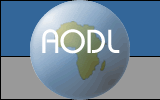|
The goal of the AODL is to adopt the emerging best practices of the American
digital library community and apply them in an African context.
Iniatives for research at the AODL consider various aspects of the
digitization process for images, text, audio, and video as they
relate to particular challenges posed by working with less spoken
languages online.
Listed below is a sampling of the papers and presentations from
this project. Some of the papers cross several projects with related
research and may include references to those projects as well. For
more information on a particular subject or to send questions, please
use our Contact the AODL form.
Digitizing Speech Recordings
for Archival Purposes (pdf format)
In this paper, we describe the best practices for digitizing speech
recordings for archival purposes. Many current guidelines do not
give adequate rational and are not specific enough about audio
digitizing practices for spoken word digital repositories. By
analyzing frequency response, dynamic range, format bandwidths,
noise, psychoacoustic, and perceptual quality, spectral evaluation
of recordings was used to develop digitization best practices.
Representing Pulaar
Digitally (pdf format)
Many African languages are seriously under-represented both on
the World Wide Web and in digital libraries. To help preserve
these languages, disseminate information to underserved populations,
and aid language learning, we need to find ways to digitize and
deliver linguistic content on the World Wide Web. In the course
of our research, we have developed tools and methodologies that
help to represent and preserve African language content (particularly
Pulaar) in a robust, open source, electronic environment.
Digital Representation of Pulaar
(pdf format of PowerPoint show)
Adapting the Open Archival
Information System model to Consumer Initiated Delivery (rtf
format)
In its simplest form, the standard OAIS model calls for a repository
system in which digital objects are submitted for storage, checked
for validity and joined with management information, tagged, and
stored for retrieval by consumers. These consumers interact with
the repository in a largely predictable fashion. For AODL and
other projects, a Delivery System based on a bi-directional model,
allowing consumers to request an ingestion of material, and a
structure to temporarily house that material for scheduled delivery,
would be needed. It would also need to allow for consumer created
delivery models for which we could not, in advance, prepare a
delivery system. Instead, we would need to develop a method by
which we could allow for this restructuring.
National Science Foundation grant (pdf format)
The African Online Digital Library is funded through an award from
the NSF. The original text of the grant is posted here. | 







